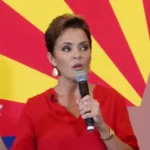By Jack Phillips
Arizona Republican candidate Kari Lake said that Maricopa County did not perform signature verification on hundreds of thousands of early ballots during the November midterms, but the county said that it did.
After a three-day trial concluded last week, Maricopa County Superior Court Judge Peter Thompson will now issue a decision to determine whether Lake and her lawyers were able to prove their case, although the judge did not say when. It came after the Arizona Supreme Court ruled that the signature verification issue could go to trial.
“Today, in court, we proved how messed-up the ONLY security feature (signature verification) on mail-in ballots is,” Lake wrote on Twitter last week as the trial concluded.
Early voters in Arizona must sign an affidavit on the ballot envelope that says they are registered to vote in the state. Those signatures are one of several security measures for mail-in ballots.
Lake sued Katie Hobbs, the current Democrat governor along with Secretary of State Adrian Fontes and Maricopa County election officials, requesting last year’s election results be thrown out or that she be declared the victor. Election data shows that Lake was behind Hobbs by about 17,000 votes.
Lake’s lawyers say there was a flood of mail-in ballots in Maricopa County at a time when there were too few workers to verify ballot signatures. Her attorneys say the county ultimately accepted thousands of ballots that had been rejected earlier by workers for having mismatched signatures.
Maricopa County has a failed process for verifying thousands of ballot signatures that even some of its own workers question, her attorneys argued in court Wednesday. Lake’s lawyers spent most of the trial’s first day showing video and taking testimony from two previous signature screeners who alleged election workers were overwhelmed.
“There’s simply no way to review signatures with respect to procedures,” said Kurt Olsen, one of Lake’s attorneys, according to The Associated Press.
Based on Maricopa County data that was analyzed by expert witness Erich Speckin, Olsen said that “approximately 274,000 ballots out of 1.3 million cast were compared and signature verified, purportedly, in less than three seconds a ballot. 70,000 in less than two seconds a ballot.”
Olsen said that based on the county data that Speckin analyzed: “approximately 274,000 ballots out of 1.3 million cast were compared and signature verified, purportedly, in less than three seconds a ballot. Seventy-thousand in less than two seconds a ballot. That’s not signature comparison” as defined by Arizona statute.
But Maricopa Attorney Thomas Liddy, in his closing arguments, rejected Olsen’s conclusion based on those calculations during last week’s trial.
“There’s no competent, mathematical calculation whatsoever to conclude that a sufficient number—even one ballot—was improperly counted, let alone that there’s a sufficient number of votes improperly counted so as to affect the election’s outcome were even rendered uncertain,” he said.
He also contended that Lake “has proven that our election process in Arizona is neither a joke nor a fraud. It works, it works well, and Arizonans can vote and be confident their vote will be counted. I ask this court to again reconfirm … Miss Hobbs’ election as governor.”
Speckin’s data, he added, were never admitted into the evidence. “Respectfully, this court should not consider those numbers when determining if Lake and team had met her burden of proof,” Liddy said, according to reports. “Not a single witness came before you and said that a single ballot pack was not reviewed for signature verification. Speckin never said 274,000 ballot packets were not reviewed,” he said.
Also during the trial, Olsen suggested Maricopa County lacked transparency after two of Lake’s witnesses testified that there were only 24 signature reviewers working the midterm election. There were only three level two reviewers, they said, according to reports.
Reynaldo “Rey” Valenzuela, the Maricopa County director of elections, said that there were more than 150 people reviewing signatures. However, that raises even more questions, Olsen suggested.
“Why was this all done behind closed doors?” Olsen said about the additional workers. “That is the secret army that Maricopa County employed.”
Earlier in her lawsuit, Lake had focused on problems with ballot printers at some polling places in Maricopa County. The defective printers produced ballots that were too light to be read by the on-site tabulators at polling places. Lines were backed up in some areas amid the confusion. Lake alleged ballot printer problems were the result of intentional misconduct.
County officials say everyone had a chance to vote and have alleged that all ballots were counted because those affected by the printers were taken to more sophisticated counters at election headquarters. In mid-February, the Arizona Court of Appeals rejected Lake’s assertions, saying she presented no evidence that voters whose ballots were unreadable by tabulators at polling places were unable to vote.
Last week’s trial is the second one that has been brought in Lake’s election-related challenge.
The Associated Press contributed to this report.






